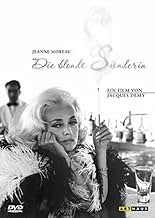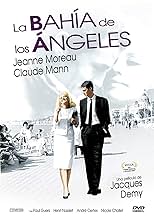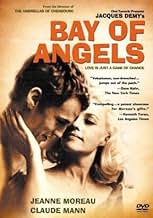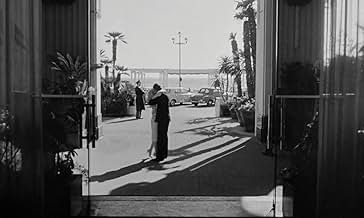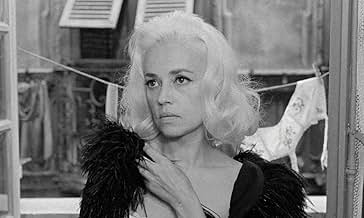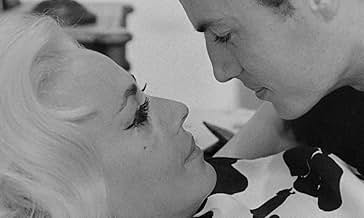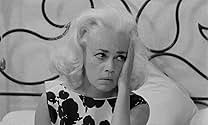VALUTAZIONE IMDb
7,2/10
4598
LA TUA VALUTAZIONE
Aggiungi una trama nella tua linguaJean is a clerk in a bank. His colleague Caron is a gambler and gives him the virus. In the casinos, Jean meets Jackie. Their love affair will follow their luck at the roulette.Jean is a clerk in a bank. His colleague Caron is a gambler and gives him the virus. In the casinos, Jean meets Jackie. Their love affair will follow their luck at the roulette.Jean is a clerk in a bank. His colleague Caron is a gambler and gives him the virus. In the casinos, Jean meets Jackie. Their love affair will follow their luck at the roulette.
- Regia
- Sceneggiatura
- Star
- Premi
- 1 vittoria in totale
Recensioni in evidenza
I was chilled to the bone, and mesmerized, by the dark crime of M (1931). Then, in the double-feature session, the 15-y-o boy trespassing as a 17-y-o, quickly changed his temperature when the 'great sinner' Jeanne Moreau appeared on La Baie des Anges (1963). «Actress Moreau forcefully demonstrates the verve, style and flamboyant femaless that make her the envy of European sex symbols much greener in years and cooler in blood. Her wicked, winning presence has saved a bad movie from utter oblivion, and at 36 she knows how to turn Bay of the Angels into a one woman show.» So wrote a reviewer (Time, November 27, 1964), and I couldn't put it better; I'm now copying this from my typewritten notes - no photocopier at home, then. That young boy would never enter a casino in his life due to this film, and he tried to see all the films starring Jeanne Moreau. I'm a winner on two counts, by money not given away to casino owners, and by a plethora of good films that were saved from oblivion by this great woman, and actress.
Jacques Demy's "Bay Of Angels" may be the best movie ever made about compulsive gambling, along with the appropriately titled "The Gambler" (1974). It's not "realistic" in its technicalities (winning three consecutive times by betting on a single roulette number happens ONLY in the movies), but I don't think it wants to be; what it's trying to get at is the psychology of gambling, and at that it succeeds (in fact, it shows two different "types" of players: the wetting-his-feet and the full addict). This movie, which offers a rare view of the high and low life in and around the Nice and Monte Carlo casinos circa 1963, has the immediacy and spontaneity that the French New Wave often strived for, minus any of the pretentiousness (just compare it with Godard's not dissimilar "Pierrot Le Fou"). Jeanne Moreau sports an iconic look and plays a daringly flawed female character; the much lesser-known internationally Claude Mann is also very good. It's a minor classic. ***1/2 out of 4.
This is a kind of interesting film. It has been overshadowed by later, greater works by Jacques Demy, such as Les Parapluies de Cherbourg, but at its heart it has pretty much the same themes - the difficulties of translating American modernity into French provincial life. Moreau has an unusual turn as an Americanised film star, complete with bleached blonde hair -do a la Marilyn Monroe, playing Jackie, a gambler on the Cote d'Azur. Jean, on holiday from his strict father, falls in love with her. This slight plot (that really is it!)is the background for meditations on chance, love, luck, and life. There are some virtuoso cinematic moments, such as Jackie running toward Jean being glimpsed in mirrors at the end of the film. The overpowering score is slightly grating, but all in all it's a charming period piece.
Although it may not go down too well with Jacques Demy devotees who enjoy seeing his characters burst into song, I consider this to be his most accomplished work. Not only is it close to perfection and technically flawless, no other film has managed to capture so well the agony and ecstasy of gambling.
Jean is introduced by a friend to the roulette tables in Nice and gets the bug. Initially he exercises great self-contol and quits when he's ahead but all that changes when he meets an addictive gambler named Jacqueline. They become lovers and the high and lows they experience in the casino are reflected in their relationship. Here Jeanne Moreau, one of the greatest of French actresses, complete with dyed blonde hair, cigarette holder and outfits from Pierre Cardin, is utterly riveting as Jacqueline and is perfectly complemented by Claude Mann whose first film this is. Excellent script by Demy although by all accounts he had little experience of gambling. Camerawork, editing and production design are exemplary. Unsurprisingly the score is by Michel Legrand whose partnership with Demy is one of cinema's most rewarding.
The gambler's life with its cycles of euphoria and despair and its dramatic fluctuations of luck, is very often frowned upon. Demy does not stoop to moralising but simply presents gambling as a metaphor for living. What this tender, bittersweet and entertaining piece does is to remind us that in the world of the gambler one law reigns supreme:THE HOUSE ALWAYS WINS.
Jean is introduced by a friend to the roulette tables in Nice and gets the bug. Initially he exercises great self-contol and quits when he's ahead but all that changes when he meets an addictive gambler named Jacqueline. They become lovers and the high and lows they experience in the casino are reflected in their relationship. Here Jeanne Moreau, one of the greatest of French actresses, complete with dyed blonde hair, cigarette holder and outfits from Pierre Cardin, is utterly riveting as Jacqueline and is perfectly complemented by Claude Mann whose first film this is. Excellent script by Demy although by all accounts he had little experience of gambling. Camerawork, editing and production design are exemplary. Unsurprisingly the score is by Michel Legrand whose partnership with Demy is one of cinema's most rewarding.
The gambler's life with its cycles of euphoria and despair and its dramatic fluctuations of luck, is very often frowned upon. Demy does not stoop to moralising but simply presents gambling as a metaphor for living. What this tender, bittersweet and entertaining piece does is to remind us that in the world of the gambler one law reigns supreme:THE HOUSE ALWAYS WINS.
On the one hand, as someone who has never gambled once in her life, this is low-key fascinating as it offers a glimpse into a world unknown to me. On the other hand, ill-advised, habit-forming, and kind of filthy as the vice is, I feel unclean even watching, like I may as well be watching people live in perpetual clouds of cigarette smoke and brush their teeth with nicotine. And on still another hand, 'La baie des anges,' or 'Bay of angels,' initially comes off as so direct - protagonist Jean's whole outlook changes after the very first time that he plays roulette - that the picture almost recalls exploitation flicks like 1936's 'Reefer madness' or 1954's 'Girl gang'; you know, the type of feature that posits a single puff of marijuana leads immediately to hard drugs and violent crime. Of course, it may be just as true that this is simply a drama that happens to center gambling, though I don't think the alternate perspectives are ameliorated by the fact that Jeanne Moreau, only 35 years old at the time this was released, is made to look significantly older in 1963 than she did in features released just before or even a few years after this. In any case, the movie is fantastically well made all around, and solidly engaging.
I don't know what is more rich and flavorful about this: Jacques Demy's direction, Jean Rabier's cinematography, Anne-Marie Cotret's editing, or Michel Legrand's original music. There's a smart dexterity to each of these facets that comes off as lightheartedness as they shape the film, and I wonder if they aren't the chief highlights above even the storytelling. With that said, Demy penned an engrossing narrative as Jean gets completely sucked into the gambling lifestyle alongside hopeless addict Jackie. The scene writing and dialogue is superb, and rather entrancing as the tale progresses. Above all, the two chief characters are complicated and intriguing in their shared ordeal, and the real focal point of both the writing and the picture as a whole. Jean and Jackie's personalities, and they way they're lit on fire by gambling, are the primary fuel for the proceedings, and I could stand for 'La baie des anges' to be longer than it is just on their account. To that same point, Claude Mann and especially Moreau give excellent performances befitting the variable dynamics of that central relationship and all that the pair go through, and it's a real pleasure as a viewer just to watch them ply their trade.
I can't say that this is perfect, as the ending is a tad too curt for my tastes, not to mention overly neat and clean; the cinematic journey isn't as entirely satisfying as it could have been if the destination weren't so close to where we began. Even setting that aside, for as well made as this is, there's no singular stroke of brilliance at any point, and the feature is never so captivating (let alone impactful) as to demand viewership. Yet for however much one may him and haw about the particulars, by and large this remains an enjoyable, very worthwhile viewing experience. It's a fine credit to all involved, including those behind the scenes, and ultimately a classic that deserves remembrance and recognition. I don't think there's any need to go out of one's way for it, but whether one is a big fan of someone involved or just looking for a good movie, as far as I'm concerned 'La baie des anges' is well worth checking out.
I don't know what is more rich and flavorful about this: Jacques Demy's direction, Jean Rabier's cinematography, Anne-Marie Cotret's editing, or Michel Legrand's original music. There's a smart dexterity to each of these facets that comes off as lightheartedness as they shape the film, and I wonder if they aren't the chief highlights above even the storytelling. With that said, Demy penned an engrossing narrative as Jean gets completely sucked into the gambling lifestyle alongside hopeless addict Jackie. The scene writing and dialogue is superb, and rather entrancing as the tale progresses. Above all, the two chief characters are complicated and intriguing in their shared ordeal, and the real focal point of both the writing and the picture as a whole. Jean and Jackie's personalities, and they way they're lit on fire by gambling, are the primary fuel for the proceedings, and I could stand for 'La baie des anges' to be longer than it is just on their account. To that same point, Claude Mann and especially Moreau give excellent performances befitting the variable dynamics of that central relationship and all that the pair go through, and it's a real pleasure as a viewer just to watch them ply their trade.
I can't say that this is perfect, as the ending is a tad too curt for my tastes, not to mention overly neat and clean; the cinematic journey isn't as entirely satisfying as it could have been if the destination weren't so close to where we began. Even setting that aside, for as well made as this is, there's no singular stroke of brilliance at any point, and the feature is never so captivating (let alone impactful) as to demand viewership. Yet for however much one may him and haw about the particulars, by and large this remains an enjoyable, very worthwhile viewing experience. It's a fine credit to all involved, including those behind the scenes, and ultimately a classic that deserves remembrance and recognition. I don't think there's any need to go out of one's way for it, but whether one is a big fan of someone involved or just looking for a good movie, as far as I'm concerned 'La baie des anges' is well worth checking out.
Lo sapevi?
- QuizAccording to Agnès Varda, Jacques Demy had little to no experience gambling prior to making this film. Although another source states Demy decided to make the movie after winning a large bet placed on the number 17. Jackie's lucky number is also 17.
- Citazioni
[English subtitled version]
Jean Fournier: I've been the studious, mild-mannered boy up until now. That's over now. I need something else.
- ConnessioniFeatured in Garage Demi (1991)
I più visti
Accedi per valutare e creare un elenco di titoli salvati per ottenere consigli personalizzati
- How long is Bay of Angels?Powered by Alexa
Dettagli
Botteghino
- Lordo Stati Uniti e Canada
- 85.840 USD
- Lordo in tutto il mondo
- 85.840 USD
- Tempo di esecuzione
- 1h 30min(90 min)
- Colore
- Mix di suoni
Contribuisci a questa pagina
Suggerisci una modifica o aggiungi i contenuti mancanti

